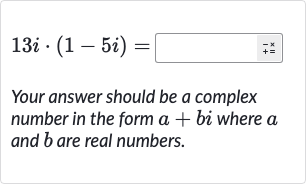Full solution
Q. Your answer should be a complex number in the form where and are real numbers.
- Write down multiplication: Write down the multiplication of the two complex numbers.We are given the complex numbers and , and we need to find their product.
- Distribute first complex number: Distribute the first complex number over the second.To multiply these two complex numbers, we use the distributive property .So, .
- Perform the multiplication: Perform the multiplication.Now we multiply the terms: (since anything times is itself),and (since we multiply the coefficients and the imaginary units).
- Remember : Remember that .The imaginary unit has the property that . We use this to simplify the term ..
- Combine real and imaginary parts: Combine the real and imaginary parts.Now we add the real part from step and the imaginary part from step to get the final answer.Real part: (from ),Imaginary part: (from ).So, the product is .
More problems from Write equations of cosine functions using properties
QuestionGet tutor help
QuestionGet tutor help
QuestionGet tutor help
QuestionGet tutor help
QuestionGet tutor help
QuestionGet tutor help
QuestionGet tutor help
QuestionGet tutor help
QuestionGet tutor help

